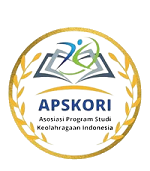Efektifitas Model Pembelajaran Diferensiasi Untuk Meningkatkan Motivasi Mahasiswa Dalam Mata Kuliah Kebugaran Jasmani
Abstract
This study is an experiment that aims to increase student motivation through the implementation of a differentiation learning model in physical fitness courses. The population in this study were students of the Faculty of Sport Sciences, Makassar State University with a sample size of 37 students. The sampling technique was carried out using a random sampling technique. The data collection technique was carried out using a motivation questionnaire with a Crinbach's Alpha reliability value of 0.960. The questions consisted of 20 items with 5 (five) answer choices. The data analysis technique was carried out using the t-test and the N-Gain test which aimed to determine the extent to which the implementation of the differentiation learning model was effective in increasing student motivation in following the lecture process. Based on the results of the effectiveness test, the maximum value was 89.29; the minimum value was 52.63; and the average value was 75.6. Based on these average values, it can be concluded that the implementation of the differentiation learning model is quite effective in increasing student learning motivation in physical fitness lectures.
Downloads
References
Alfath, A., Usman, A., & Utomo, A. P. (2023). Analisis Motivasi Belajar Siswa Dalam Implementasi Pembelajaran Berdiferensiasi. Education Journal: Journal Educational Research and Development, 7(2), 132–140.
Gymnastiar, A. M. (2024). IMPLEMENTASI PEMBELAJARAN BERDIFERENSIASI DALAM MENINGKATKAN MOTIVASI BELAJAR SISWA DI KELAS. El Banar: Jurnal Pendidikan Dan Pengajaran, 7(02), 24–45.
Hapsari, A. N., Pratiwi, D. A., Firdausi, F. N., Alawiyah, F., Sari, N., & Mulyana, A. (2024). MENINGKATKAN KUALITAS PEMBELAJARAN PENDIDIKAN JASMANI MELALUI PENDEKATAN OLAHRAGA DAN KEBUGARAN DI SEKOLAH DASAR. Jurnal Ilmiah Kajian Multidisipliner, 8(5).
Hasanah, E., Maryani, I., & Suyanto, R. G. (2023). Diferensiasi Berbasis Digital Di Sekolah. Yogyakarta: Maret.
Iman, I. (2024). Penerapan Pembelajaran Berdiferensiasi Oleh Mahasiswa PPG PGSD Prajabatan Lintas Jurusan Pada Kegiatan Praktik Pengalaman Lapangan (PPL). Prosiding Seminar Nasional PPG Universitas Mulawarman, 5, 55–61.
Khomsanah, N., Sulianto, J., & Mushafanah, Q. (2023). Analisis Gaya Belajar Peserta Didik Sebagai Persiapan Pembelajaran Diferensiasi Di Kelas 1 Sd Supriyadi 02 Semarang. Didaktik: Jurnal Ilmiah PGSD STKIP Subang, 9(2), 4979–4993.
KRISTINA, A. P. (2023). SURVEI TINGKAT KEBUGARAN JASMANI PADA PEGIAT OLAHRAGA DI PONTIANAK KOTA. IKIP PGRI PONTIANAK.
Nisa, C. N., Maulana, A. A., & Agyl, A. A. (2024). Pembelajaran Diferensiasi Dalam PJOK: Literatur Review. SEMINAR NASIONAL LPPM UMMAT, 3, 684–693.
Prihandini, D. R., Azizah, S. A., & Atikah, I. (2023). Sinergi antara pelaksanaan pembelajaran berdiferensiasi dengan Teaching at The Right Level dalam menghadirkan lingkungan belajar inklusif. Jurnal Teknologi Pendidikan, 1(2), 11.
Santoso, G., Hermawan, C. M., Rosfiani, O., & Shabri, N. R. A. (2023). Pola Perencanaan Pembelajaran SD/MI Melalui Pembelajaran Terdiferensiasi Berbasis Minat. Jurnal Pendidikan Transformatif, 2(6), 161–173.
Syahputri, A. S., Dewi, C., & Widyaningrum, H. K. (2023). Pengaruh Pembelajaran Diferensiasi Berbantuan Website Genially terhadap Motivasi Belajar Siswa. Seminar Nasional Sosial, Sains, Pendidikan, Humaniora (Senassdra), 2(2), 685–691.
Wahyuni, S., Thahir, A., Karma, R., & Putriani, A. (2023). Pembelajaran Berdiferensiasi pada Mata Pelajaran Bahasa Indonesia Materi Menulis Puisi di Tingkat SMP. Jurnal Review Pendidikan Dan Pengajaran (JRPP), 6(2), 264–269.
Wijayanto, A. (2023). Membedah Keilmuan Pendidikan Jasmani Kesehatan Dan Rekreasi.
Zeng, Y., & Yao, D. (2023). A Literature Review of The Academic Motivation Scale (Ams) and Its Reliability and Validity. International Journal of Education and Humanities, 8(3), 43–46.
Copyright (c) 2024 Akbar Syafruddin

This work is licensed under a Creative Commons Attribution-ShareAlike 4.0 International License.
Authors who publish with this journal agree to the following terms:
- Copyright on any article is retained by the author(s).
- The author grants the journal, the right of first publication with the work simultaneously licensed under a Creative Commons Attribution License that allows others to share the work with an acknowledgment of the work’s authorship and initial publication in this journal.
- Authors are able to enter into separate, additional contractual arrangements for the non-exclusive distribution of the journal’s published version of the work (e.g., post it to an institutional repository or publish it in a book), with an acknowledgment of its initial publication in this journal.
- Authors are permitted and encouraged to post their work online (e.g., in institutional repositories or on their website) prior to and during the submission process, as it can lead to productive exchanges, as well as earlier and greater citation of published work.
- The article and any associated published material is distributed under the Creative Commons Attribution-ShareAlike 4.0 International License







1.png)







